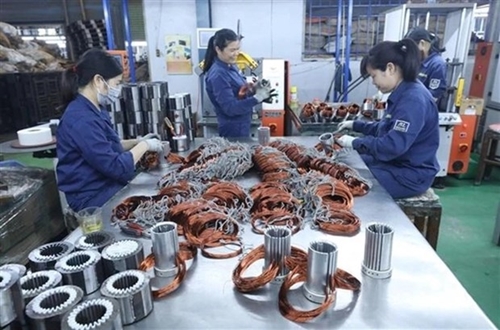That's the view of economists and policymakers speaking at a recent conference at the National Economics University (NEU).
Prof. Pham Hong Chuong, head of the NEU, said a key objective for the Southeast Asian economy in the coming years remains to figure out how to break out of the middle-income trap, an issue shared by neighboring countries including Thailand, Malaysia and Indonesia.
    |
 |
|
Workers at a water pump factory in the Northern province of Bac Ninh. |
Economist Ngo Thang Loi said Vietnam must align rapid growth with quality growth, stressing the importance of creating a balance between economic development and social progress. This is considered very challenging as to realize Vietnam’s high-income objective, the economy must maintain an average growth of 7% in the next 20 years, he said.
The current robust development of digital technology, including artificial intelligence, has been providing Vietnam’s economy with ample opportunities for growth, improved competitiveness and ability to produce high-quality products and services. At the same time, they pose major challenges including increased unemployment, political and social challenges, infrastructure issues and greater risks related to information safety and security.
To make matters worse, the country looks at an ageing population and rising wages against a backdrop of slowdowns in global trade and increasingly stricter environmental standards. Meanwhile, environmental degradation, climate change, and major outbreaks such as the COVID-19 pandemic have stronger impacts that can undermine the country's development process.
He called for a fairer playing field for all economic players, with a stronger focus on policies for the private sector.
"Global experiences show that countries can achieve middle-income levels through liberalization, privatization, and international integration, but to reach higher income levels, policy efforts are required to stimulate the dynamism of the private sector," he said.
Prof. Tran Van Tho from Japan's Waseda University said in recent decades, Vietnam has made significant progress including income growth, poverty reduction, education improvement, mortality rate reduction, economic structural transformation, and successful policies attracting FDI and signing free trade agreements. There are several successful large corporations, namely VinGroup/Vinfast, Viettel, and FPT.
"But Vietnam needs to do better than that," he said.
According to Tho, despite remarkable development in the 1990s, the country has not achieved a high development stage, or 10% annual growth rate sustained for ten years. During the demographic golden age, Vietnam's industrialization rate remained low, and the size of the economy's informal sector remains significant with too many micro and small enterprises.
He emphasized the importance of economic policies to accelerate structural transformation to increase productivity, formalize the informal sector, increase the scale of enterprises to boost capital accumulation and technological innovation, reform and develop production factor markets to allocate resources efficiently and promote structural transformation, focus on providing skilled labor and encourage R&D activities.
He said in the next decade, industrialization expansion, industrial restructuring, and institutional reform to allocate resources efficiently will serve as productivity boosters for Vietnam. At the same time, the country must prepare for a growth era based on innovation and creativity for the 2030s and beyond.
Prof. Kenichi Ohno from the Japan National Graduate Institute for Policy Studies (GRIPS) said Vietnam’s challenge is that growth is slowing down at the middle-income level too early instead of accelerating. In addition, the country heavily relies on FDI for exports, technology, and economic restructuring, but its participation in the global value chain is limited. It has also been slow in building a modern transportation system.
Kenichi said there are signs of Vietnam falling deeper into the middle-income trap, including slow growth at the middle-income level, a shortage of skilled engineers, innovators, and high-skilled workers, average labor productivity and total factor productivity. He advised the Vietnamese Government to quickly address said issues by improving leadership capacity, and economic policy and promoting technology and innovation with fewer administrative barriers.
Economist Can Van Luc said the country's economy is on the path to recovery, but as a highly open economy, external challenges and internal difficulties impact its growth and resilience.
He called for additional stimulus for economic growth, including effective public investment disbursement, strong and sustainable development of the private economic sector, and boosting domestic consumption.
Source: VNA